agender-aro-ace ... registered (vaccinated and house-trained) overthinker and inventer of stupid jokes ... follows (politely) as worlds-laziest-polymath
Don't wanna be here? Send us removal request.
Text

needless to say I'm loving that the pink specs remain active members of the collective
13 notes
·
View notes
Text
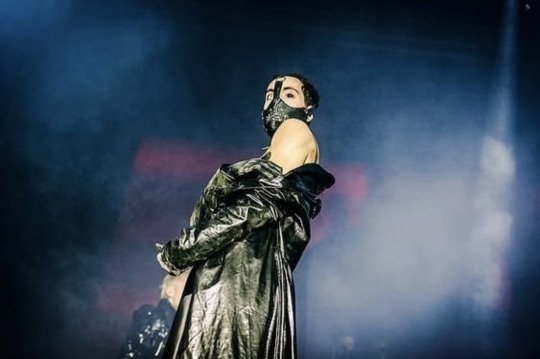
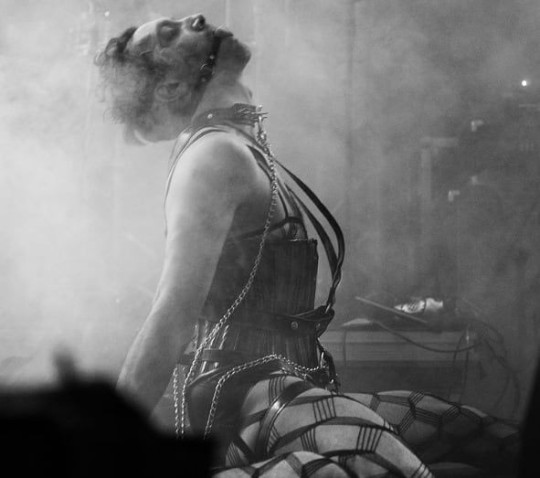
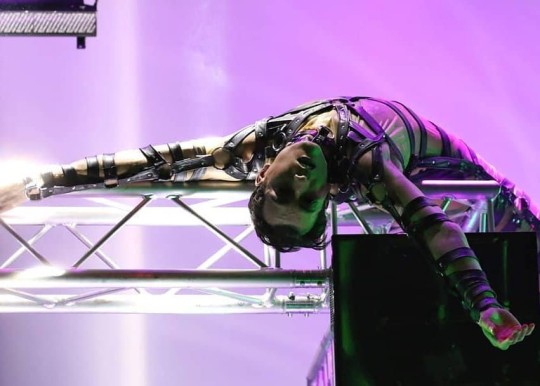
So cheap ...?
According to my phone, I was thinking about these on this day four years ago.
Fair.
So the top two were Ódýr at Lunga (or maybe Roskilde for the second one) in 2019, the bottom was Ógleđi at the homecoming concert.
And I was looking at them, out of context on a Tuesday morning in a different world, and thinking ... basically, how would I explain them to someone?
Out of context, they're entirely misleading.
Yet so very right. So very integral to my experience and memory of these songs.
I haven't done many Hatari nostalgia posts, but now this.
#(I don't have the credits to hand#but they're all fairly famous shots)#hatari#art#performance art#you can never have too much andrean#like ever#Hatari nostalgia posts
9 notes
·
View notes
Text
My monthly patreon bill keeps going up and up ...
By the way, if you haven't seen, Matthías and Klemens have a new English-language podcast/show together on Patreon called "Seasons of Friendship", which is ultimately sort of a nice excuse for them to get together and hang out and create something now that Hatari can no longer serve that purpose in their lives.
In the first episode, released yesterday, they discuss Matthías's departure from the band, some stories of their time in the band and musings on the overall experience, and more. There is unfortunately no free tier (the lowest tier to gain access to the episodes is $7 a month), but I at least enjoyed the show and do recommend it if you can spare the money and miss hearing the two of them be dorks together.
17 notes
·
View notes
Text


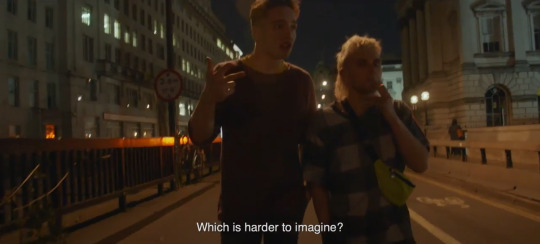
from the "A Song Called Hate" documentary
143 notes
·
View notes
Text

#does someone need to tell them that they should have a following before the patreon?#hatari#the performance art collective is at it again
9 notes
·
View notes
Text
You know, the first thing I read online, way back in '19 was an article by Ellie Chalkley, who said at the end that she had no idea where the Hatari journey was going, and she wouldn't be surprised if they ended up as children's TV hosts.
This could be it ...



#matthias haraldsson#klemens hannigan#hatari#seasons of friendship#patreon#what are they up to now?#children's tv hosts? why not?
72 notes
·
View notes
Note
Oh gosh, I missed it.
Happy anniversary!
I know I’m a day late but whatever. Happy 5 year anniversary to the flag incident at the final!!!
Happy late anniversary to Hatari doing what they could to stand up for Palestine!
19 notes
·
View notes
Note
100% true of me too!
Five years!
Over the past few years or so (I didn’t even realise it’s been that long) since I discovered this blog, when I’ve been listening to Icelandic music or watching bits of Icelandic shows, I’ve been able to tell myself “I know what that word means” or “I know what case that’s in cos of the form of ég being used” and I just want to say a massive thank you. I’m definitely no where near fluent, but I’m learning, even if it’s very slow. Takk fyrir 💜💜💜
You’re very welcome! I’m really thrilled to facilitate people out there taking an interest in our language and learning to understand or speak it. Thank you!
11 notes
·
View notes
Text
It's great to read this in the context we have now. You can really appreciate his rhetorical footwork around the boycott vs. Do something debate.
Thank you for the translation and all the extra work it must have taken
Brilliant work as always
🖤
Matthías on Vikan með Gísla Marteini, 15.12.23
Another translation request I missed: Matthías was on Vikan með Gísla Marteini before Christmas, the other guests being Jón Jósep Snæbjörnsson or Jónsi, who competed in Eurovision on Iceland's behalf both in 2004 and 2012, and actress, screenwriter and director Tinna Hrafnsdóttir. The discussion touched on Palestine and Eurovision boycotts (at this point Matthías would have already been involved in Bashar Murad's Söngvakeppnin entry, but keeping it under wraps), Matthías's shift from the toughest guy around to a soft family man, his current job as a dramaturge for the National Theater, Christmas traditions, and Danish.
I fully translated more of this show than I really should have; it took ages and I should've tried to summarize more of the non-Matthías bits, but there was a lot of Matthías scattered throughout. Oh well. Hope you all enjoy hearing more from him, at least!
During the introductions, Gísli Marteinn says two of the three people on the couch have their names attached to bands they're no longer part of; he'd wanted to say "Jónsi í Svörtum fötum" (referring to Jónsi's old band Í svörtum fötum) and "Matti í Hatara" (Matti from Hatari). Matthías says "Skellur," which we could translate as, "That's rough." Gísli Marteinn affirms that neither would be correct. Jónsi says "What are we even doing these days? Are we doing anything these days?"
Gísli Marteinn mentions that last time Matthías was on the show, he was going to say he's no longer part of Hatari, but then they forgot to talk about it. Matthías goes "Oh yeah, right. That was supposed to be the big news." But Gísli Marteinn says they're all here because of the interesting stuff they're currently working on.
The show moves on to other things for a while, but we pick back up with them later, after a segment where Gísli Marteinn goes through the news of the week and makes jokes about them.
After a bit of banter with Jónsi about how Gísli Marteinn's dad jokes would have gotten him canceled many times over at Jónsi's dinner table (Gísli Marteinn says more dinner tables than his would) and a bit more talk about how they're all doing such exciting things, Gísli Marteinn moves on:
GÍSLI MARTEINN: There's one issue we didn't mention there despite being prominent in the news, and that's that we're watching the horrible actions of the Israeli army in Gaza, and it makes it hard to quite get into the Christmas spirit. And into that comes this discourse about Eurovision, which is unusual but understandable. I mean, we have two Eurovision-goers here--
JÓNSI: Uh oh.
GÍSLI MARTEINN: I mean, in both of your cases there was talk of whether we should boycott. And Matti, you went to Israel. You had a message to Israelis. When you watch this discourse, what do you think?
MATTHÍAS: Well, I think it would be very courageous and good of RÚV to send a clear message. I mean, let's imagine that after the invasion Russia had competed in Eurovision, but Ukraine hadn't. It's a bit like that, from my point of view. Israel is competing but Palestine isn't. I think either there should be a rule that while there's active warfare going on you shouldn't be in this contest that's supposed to be about peace. Or you could pull out more flags, Palestinian flags, and include Palestine. I think that would be a neat thing to call for. But the boycott movement is very important, of course, even though we didn't quite follow it when it was our turn.
GÍSLI MARTEINN: Right, they wanted you to boycott.
MATTHÍAS: Yeah. But boycott is a silent action. A bunch of people boycotted the contest when we were competing; people just didn't hear about it because they weren't recorded anywhere. We went a bit of a different route, but that's not to diminish this important movement.
GÍSLI MARTEINN: No. It's a complex matter. Everyone who insists this is simple perhaps doesn't see every side of it.
MATTHÍAS: No, it is complicated. But it's also very simple. I mean, what's happening now in Gaza is just -- I think people don't realize because they're so used to hearing news about this in their ears, the region of Palestine, but this right now is just -- I'm not going to completely kill the Christmas spirit in the show, but this is so much worse than ever before, ever in the history of Palestine. And that's going on right now.
GÍSLI MARTEINN: Yeah, absolutely. And I didn't mean to say that that's particularly nuanced - of course that's simple, in itself.
MATTHÍAS: Yeah. But then you get everything else, which is complicated, of course.
GÍSLI MARTEINN: Jónsi, even when you went, even though it wasn't the Israeli-Palestinian conflict, I remember a call for you to boycott.
JÓNSI: Yeah, there was.
GÍSLI MARTEINN: Namely, you went to Baku in Azerbaijan.
JÓNSI: Yes, it was 2012, and I think that was… It's been a while, and I'm sorry, there are probably a lot of people who know a lot more about this than I do because I perhaps tend to just try to forget these kinds of things and do something else. Please excuse me, I'm sorry. How often have I apologized now?
GÍSLI MARTEINN: A lot!
MATTHÍAS: Like he said, there's no wrong thing to say on this show.
JÓNSI: Right, thank God. Wiener dog.
[laughter]
JÓNSI: No, sorry. There was discourse about how there are human rights abuses going on down there, and we became aware, the group that went, me and Greta Salóme and more, that there were people who were asking us to show solidarity in action. And it was very hard, just sort of being between a rock and a hard place. I hadn't been imagining that this was something I would be tackling - aside from the fact I was probably just a privileged dude, being pampered out there. But by finals night, we really felt like we were in a bind. It was weird to be about to compete for our country and make everyone proud, on the one hand, while knowing that there were people who, from the literal safety of their armchairs in Iceland, wanted us to do something different. And it was always a bit unclear exactly what should be done -- you get so many possibilities, and you don't really know how to react because you think it's not going to matter at all what you do, and you're always going to make someone mad. Just like how you can no longer do a good deed and tell anyone about it, because then it's time to tell you off for trumpeting it. You feel like there's no right chess move to make, these days. But nonetheless, I don't want to minimize that there are horrible things happening in Gaza, and it's weird to feel that political angle coming into the music world. But I'm not an expert on it, I admit.
GÍSLI MARTEINN: Of course, and you weren't brought here to opine as an expert. But it's necessary to discuss it. And -- Tinna, we were talking before the show about how it's hard, or you feel guilty for being in a good mood, or a Christmas mood.
TINNA: Yeah, it's a different Christmas season than often before, almost like you don't dare to be happy because there's so much going on.
GÍSLI MARTEINN: But you, artists and entertainers, putting on shows and making music and creating TV shows that are meant to delight us -- give us some good message about how we can do both at the same time.
MATTHÍAS: You're commissioning a message from us?
GÍSLI MARTEINN: Yes. You were brought here to be…
MATTHÍAS: You can do both.
JÓNSI: Can't we just make it a message, like kop28 [I'm not sure what he's referencing], we're trying to show you some message that doesn't really mean anything by itself? I do realize that if I breathe here in Iceland, that doesn't really change much in Gaza. But I think we should keep talking about it, but I'm also an advocate for focusing on the good things. We should work from the good that exists in the world, and try to say, isn't the influence of good better down there than not? Maybe it doesn't affect anything, I don't know. But…
GÍSLI MARTEINN: Be joyful, but don't forget about Gaza. Is that the message?
JÓNSI: A good T-shirt.
MATTHÍAS: Yes. If you want the core message, it's that.
GÍSLI MARTEINN: To be joyful but don't forget about Gaza.
MATTHÍAS: Yes, you've got it.
GÍSLI MARTEINN: Now we move to other things. Thank you for giving a bit of where your minds are at with all of this. I know it was a heavy beginning, but sometimes that's necessary.
JÓNSI: Yeah, it's necessary. That's quite true.
GÍSLI MARTEINN: Should I talk about the clothes of the men on the couch next? You're both wearing Icelandic wadmal.
MATTHÍAS: You bet!
GÍSLI MARTEINN: Is this the latest fashion trend?
MATTHÍAS: I got married in this, this summer, so I just decided to use it.
GÍSLI MARTEINN: It looks great!
TINNA: They specifically asked me to sit in the middle so that they wouldn't be side by side in tweed.
GÍSLI MARTEINN: That would be tacky.
JÓNSI: My friend Gunni at [clothing store] Kormákur og Skjöldur is very happy with us both, no doubt. But he doesn't realize how ridiculously warm it is under this, and we had a heavy discussion earlier, and they had to make up my ears twice so they wouldn't get red, and it's all just firing up now.
They move on to talking with Tinna about her new TV series Heima er best, which they compare to sort of an Icelandic Succession, which was just nominated for the Nordic scriptwriting awards, and then about when Jónsi and Tinna co-starred in Grease and then in Ávaxtakarfan ("The Fruit Basket", an Icelandic children's musical about bullying featuring anthropomorphic fruit). To stay sane after writing up all this I won't translate this whole section since Matthías doesn't have much to say in it, although he does express surprise that they had theatrical productions during the summer (Grease was an indie production that just kind of rented the City Theater over the summer).
GÍSLI MARTEINN: Speaking of your former lives and such… Matti, when you went to Eurovision and were Matti the Hater [Hatari], I would have said you were just about the coolest, toughest guy in the country. Then fifteen minutes later you're on your knees at Sky Lagoon proposing to your wife and had become so soft and tender and beautiful and in love, and now you've got a kid and another on the way.
MATTHÍAS: Exactly.
GÍSLI MARTEINN: Was Matti from Hatari all fake, or did you just change that much?
MATTHÍAS: Mmm, I've always been soft. The other stuff is a bit of a costume. But of course it softens you when you're in love, and softens you more when you love your child. So maybe that's the Christmas message you were looking for.
GÍSLI MARTEINN: I knew you had one in there!
MATTHÍAS: No, definitely. I was on my way home from work earlier and my sister-in-law who was babysitting called me and said, "Sóley has pooped everywhere!", and I found it to be good news, because I like hearing news of my daughter but also, "everywhere" means some of it went in the potty, so I was kind of just, "Score!" to hear that message. It changes a bit… You've got new and exciting stuff to deal with. It's wonderful. And I'm looking forward to having two. It'll be… Two girls!
GÍSLI MARTEINN: Oh?
MATTHÍAS: Yeah, it's a girl.
GÍSLI MARTEINN: I can recommend having two girls!
TINNA: I'm lucky to have two - twins. Two for one in my case.
MATTHÍAS: So you were quick.
TINNA: Just finish it all in one.
JÓNSI: In one evening, or?
TINNA: One evening! All in one, one evening.
GÍSLI MARTEINN: How old are your twins?
TINNA: They're eleven. And when I told them I was going to sit on a couch with the Hatari guy, they were like, "Wow, Mom!"
GÍSLI MARTEINN: If you've got twins, is the hardest part over, or is it only over when they're about thirty?
JÓNSI: Good question.
TINNA: I'm actually very lucky. They're very good friends and mesh together well, so it's gone pretty well for us. But then you never know what the teenage years will be like.
GÍSLI MARTEINN: Right. We're making our way there.
TINNA: We're making our way there.
JÓNSI: But doesn't that make you alone against them, and then there's two of them?
TINNA: There are some plots going on that I don't quite know about, but I try to keep up the radar.
JÓNSI: A lie detector.
TINNA: Yes, and a lie detector and everything. They're watching me right now; they're probably going "Oh my God, Mom, don't talk about us!"
MATTHÍAS: And do you use these plots to write your scripts?
TINNA: Oh, yes, definitely.
JÓNSI: I also… How old are they?
TINNA: Eleven.
JÓNSI: What are their names again?
TINNA: Starkaður Máni and Jökull Þór.
JÓNSI: I'm going to look into camera two: Starkaður Máni and Jökull Þór, if you aren't good until Christmas, Matti from Hatari and Immi the Pineapple [Jónsi's character in Ávaxtakarfan, the tyrannical villain] are coming to your house.
[laughter]
MATTHÍAS: Correct.
They go to commercials. When we return to the show, Jónsi has brought out a guitar and is enthusiastically leading the audience in singing Christmas songs.
GÍSLI MARTEINN: Jónsi formerly of Í svörtum fötum decided to keep everyone pumped while we went to commercials -- while capitalism took its share, since you didn't manage to bring it to its knees, dear Matti.
MATTHÍAS: The boys are working on it.
GÍSLI MARTEINN: The boys are working on bringing capitalism to its knees.
They talk about Jónsi and his wild success as a pop star in the early 2000s and how now he works for a financial corporation. He describes how fame and being surrounded by people who worship you almost regardless of what you do just kind of isn't healthy and he had just become kind of a dickhead, and he withdrew from it all to get away from it.
MATTHÍAS: But Gísli, you're one of those exceptions. You've been famous for a long time but you're not a dickhead. [He says a few more words that I can't make out over the laughter.]
GÍSLI MARTEINN: That's the best compliment I've ever gotten! Thanks, Matti, I'm grateful you say that. But back to you, you said earlier you were on your way home from work. Where do you work?
MATTHÍAS: The National Theater!
GÍSLI MARTEINN: I mean, you aren't Matti from Hatari anymore.
MATTHÍAS: No, I'm Matti from the National Theater!
GÍSLI MARTEINN: Matti from the National Theater! Who doesn't know Matti from the National Theater?
MATTHÍAS: Hopefully more people know now!
GÍSLI MARTEINN: We know you had become a playwright. You wrote award-winning plays. And theater is just your muse right now?
MATTHÍAS: It seems to be that way. The urge to write is still strong in me, and I'll probably keep doing that.
GÍSLI MARTEINN: Don't you have the title of dramaturge, which nobody knows what that is, except Tinna?
MATTHÍAS: The chosen few know.
JÓNSI: Can we know what it is?
MATTHÍAS: Those of us who know what it is recognize each other.
JÓNSI: And no one says anything.
GÍSLI MARTEINN: A secret society!
MATTHÍAS: No, it's translated as 'listrænn ráðunautur' ["Artistic advisor"] for the National Theater, and of course it's the best job in the world. You get to read plays, watch them, your job is to have opinions on theater, talk about theater. You're part of a book club called the project choice committee of the National Theater, and you're in contact with all the directors, and reading scripts that Icelandic playwrights entrust to the National Theater, which is a big responsibility for me because I've been on the other side there.
GÍSLI MARTEINN: Is this your dream job?
MATTHÍAS: It's -- of everything that exists that is a job, this is the best one.
GÍSLI MARTEINN: Very good!
MATTHÍAS: Because the other stuff that I'd want to do even more doesn't exist as a job. It's just freelance. But this is perfect.
They turn to Tinna to talk about her project directing a drama series about Vigdís Finnbogadóttir, former president of Iceland. Matthías mentions he's excited about it and that they compared it to The Crown during the break and that really piqued his interest.
GÍSLI MARTEINN: And speaking of our heritage, you're doing the Edda [Snorra-Edda, the most comprehensive source about the old Norse religion, written in the 1200s] at the National Theater, right?
MATTHÍAS: Yes, I'm working on that as a dramaturge, and it's very exciting.
GÍSLI MARTEINN: It's your Christmas show, right?
MATTHÍAS: The National Theater's Christmas show.
GÍSLI MARTEINN: The Edda in its entirety?
MATTHÍAS: Yes, it's very comprehensive. But it's full of unexpected little twists for those of us who know these stories -- the myths, Thor, Loki, Óðinn and all that. Or for those who don't know and want to get to know their heritage, you're also welcome. But everyone who liked Njála [Brennu-Njáls saga, one of the Sagas of Icelanders written between ~1200-1350 CE] at the City Theater, if you saw that, this is the same director, Þorleifur [Örn Arnarsson]. That was one of the coolest shows I've ever seen, so this should be something.
They move on to a Berglind Festival (comedian) bit about rebranding Christmas. When we return to the studio, she has joined the couch, everyone is wearing sunglasses, and they're each doing some kind of little dance to the Christmas song remix still playing in the background. Matthías says, "You have to warn us if we're going to dance on the show." Gísli Marteinn says, "I didn't see you, did you look like dorks?" Matthías: "I don't know."
GÍSLI MARTEINN: So if we keep to the traditional Christmas, Christmas is next weekend. Do you have any bizarre Christmas traditions, or are you very standard about it?
MATTHÍAS: Speaking of rebranding, my dad… At the Ban Thai restaurant downtown, there's a course called [kung hansa?] [I looked up their menu to try to find out what the correct spelling is but unfortunately the online menu had no name similar to that], a shrimp course, and we find it Christmasy. We often have it as a starter on Christmas.
GÍSLI MARTEINN: On Christmas Eve? [Christmas Eve is the height of the Christmas celebration in Iceland.]
MATTHÍAS: Yes.
BERGLIND: So do you put an almond in the rice? [She's referring to the Icelandic Christmas tradition of making rice pudding and putting a single almond in it, often as a starter; whoever gets the almond in their bowl should try to discreetly remove it and then keep it hidden until the end of the course. If they do it successfully without being spotted, they will receive a special 'almond gift'.]
MATTHÍAS: Uh, no.
BERGLIND: Okay, lame.
GÍSLI MARTEINN: So do you just go to Tómas at Ban Thai and buy it, or do you cook it at home?
MATTHÍAS: We buy it at Ban Thai.
GÍSLI MARTEINN: Wow, well done! How did that start?
MATTHÍAS: We were just at Ban Thai celebrating some milestone, as we do, and then someone said it was kind of a Christmasy taste.
GÍSLI MARTEINN: Very good. Tinna, that's a hard act to follow.
TINNA: I will try my best. We have very firm traditions and always go to my mom on Christmas Eve and eat Danish duck, speaking of Danish Christmas earlier. It's an old family tradition, and we have the Christmas pudding and an almond gift and so on.
GÍSLI MARTEINN: Is Danish duck getting imported?
TINNA: My mom has some secret ways of procuring Danish duck, I'm not going to get into that. In previous years we would sometimes sing afterwards, "Og nu har vi jul igen, og nu har vi jul igen, og julen varer helt til påske." [Danish: "And now we have Christmas again, and now we have Christmas again, and Christmas lasts all the way until Easter."] Do you know it?
GÍSLI MARTEINN: No!
TINNA: It's some Danish song. I love the lyrics - og julen varer helt til påske.
JÓNSI: I said that at the start of the show.
TINNA: Wouldn't that be great, just having Christmas all the way until Easter?
GÍSLI MARTEINN: Christmas until Easter, definitely!
MATTHÍAS: Now you, and earlier there were some people in the audience talking about flødeskum [whipped cream], and you [Gísli] earlier with leverpostej [Danish liver pâté] -- do people generally just speak Danish--
JÓNSI: Danish is taking us over.
MATTHÍAS: --at least at Christmas?
GÍSLI MARTEINN: Don't we? I mean, it's all Danish traditions we have here.
MATTHÍAS: It sounds great, at least.
GÍSLI MARTEINN: It sounds great. Jónsi, the pressure is on.
JÓNSI: Så man sidder i sin festlige måde [Danish: "So you sit in your festive manner…"]… No, definitely not.
He talks about his workplace's tradition where they eat as much as they can and simply decide not to gain any weight by sending a message to the cosmos; Matthías doesn't comment further from here.
#matthías tryggvi haraldsson#translation#vikan með gísla marteini#hatari translations#services to humanity#some good rhetorical footwork there Matthí
13 notes
·
View notes
Text
Just leaving this here.
#did i even add it properly?#you'd think I'd have learned this site by now#anyhow#bashar murad#vestrið villt#wild west#andrean sigurgeirsson#you can never have too much Andrean#not eurovision
2 notes
·
View notes
Video
Hatari nostalgia posting.
Five whole years?
Really?
youtube
This is a brief “interview” from music festival Aldrei fór ég suður 2018 (“I Never Went South”; “going south” in Icelandic means to go to Reykjavík, particularly to move to Reykjavík from other smaller settlements, and the music festival takes place in Ísafjörður in the West fjords, the name referencing a song by Bubbi Morthens). Transcript and translation below.
Keep reading
#hatari#this one clearly passed me by back in the day#hatari nostalgia post#spillingardans#hatari translations
34 notes
·
View notes
Note
When Hatari won Söngvakeppnin in 2019, were there any reactions from any ultra-conservative groups in Iceland? Cos I know in my country if a performance and song like that was selected for Eurovision, some people wouldn’t be very happy lol
Of course there were people who were displeased by it, for all sorts of reasons, as will happen with pretty much anything. People who thought it was too sexual for a family-friendly contest because of the BDSM aesthetics, people who thought the fascist aesthetics in the video were disturbing, people who thought singing about hate prevailing is a bad message, people who just think that kind of music is terrible noise, people who thought any artist participating in Söngvakeppnin on the year the contest was held in Israel was complicit in Israel's pinkwashing of its human rights abuses and it was rank hypocrisy of them to presume to participate in the name of calling attention to Palestine. One opinion article even accused them of appropriating BDSM culture (and then a member of the BDSM society wrote a counterarticle going actually we fucking love Hatari over here, stop getting offended on our behalf).
Broadly, though, they were supported! They did win the duel round. A lot of Icelanders really wanted to make some kind of statement on Palestine since RÚV wasn't withdrawing.
30 notes
·
View notes
Note
"...songs that I find bafflingly forgettable have qualified before."
I relate to this extremely.
What’s your opinion on Hera’s song for this year? If Iceland do decide to participate, could you see it qualifying or not?
I find it extremely generic and forgettable and had to pull it up again just now to remember what it even sounds like (I didn't watch Söngvakeppnin but had briefly listened to the other contestants a little while ago). I would not personally expect it to qualify, but songs I find bafflingly forgettable have qualified before.
#the many puzzles of eurovision#i hadn't been going to watch this year#now there's zero reason to#hatari translations
7 notes
·
View notes
Text
youtube
Palestinian pop singer Bashar Murad is hoping to represent Iceland at the Eurovision Song Contest in May and bring “a Palestinian voice to the main stage”. [...] Murad is competing in the national final with a song co-written by Einar Stefansson of the Icelandic band Hatari, known for raising a banner showing Palestinian flags during the 2019 Eurovision Contest. [...] In Iceland’s domestic qualification, singers of any nationality can participate if they sing their song in the first semifinal in Icelandic. Murad, who was born in and lives in occupied East Jerusalem, said it was difficult to learn the song in Icelandic, but he found some similarities to Arabic. His entry, Wild West, tells the story of challenging boundaries and chasing dreams against all odds. “I wanted to illustrate how many obstacles as Palestinians we have to go through in order to be heard … we’re excluded from every mainstream platform,” he said. “Everyone has theories about my participation. And everyone is politicising my existence when I’m really just a human who had a dream and applied for this competition fair and square.” When asked if Murad wants Israel to participate in the competition, he said, “Of course, I don’t want my occupier to be there.” “But my main focus right now is to be able to bring, for the first time in history, a Palestinian voice to the main stage.”
Iceland’s domestic ESC qualification, Söngvakeppnin, will be decided today (2 Mar 2024).
1K notes
·
View notes
Video
youtube
BASHAR MURAD - INTIFADA ON THE DANCE FLOOR (Official Music Video)
7 notes
·
View notes
Note
Sigh.
What do you think about the söngvakeppnin results (and the post hera björk liked after the contest)
Very disappointed, of course. If it’s not Bashar I’m just boycotting the main contest. Ironically, a lot of the most ardent Palestine supporters in Iceland were boycotting Söngvakeppnin altogether, while every questionable racist undoubtedly banded together to vote Hera in the duel, so the boycotts may actually have hurt him.
I don’t know what post you’re talking about; you’re going to have to elaborate on the gossip.
17 notes
·
View notes
Text
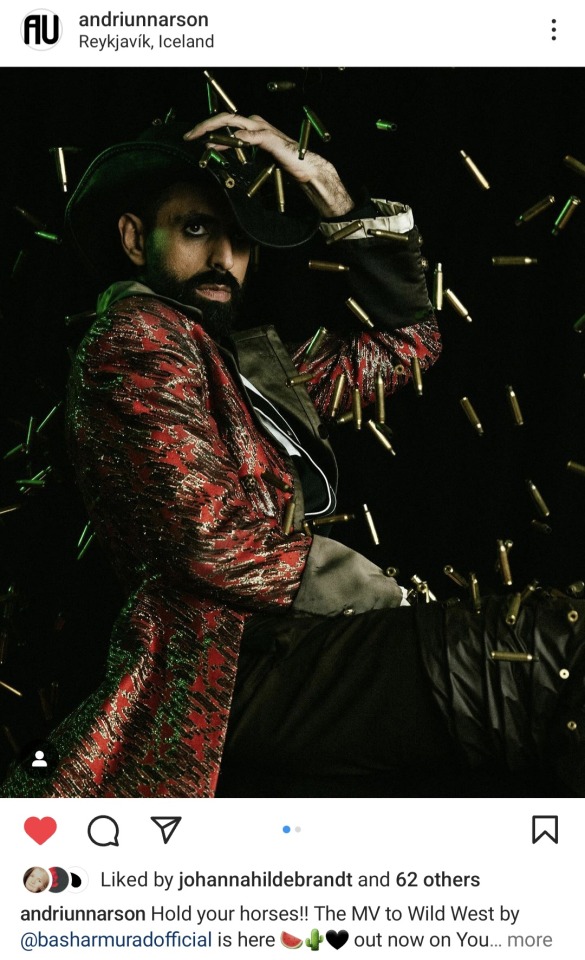
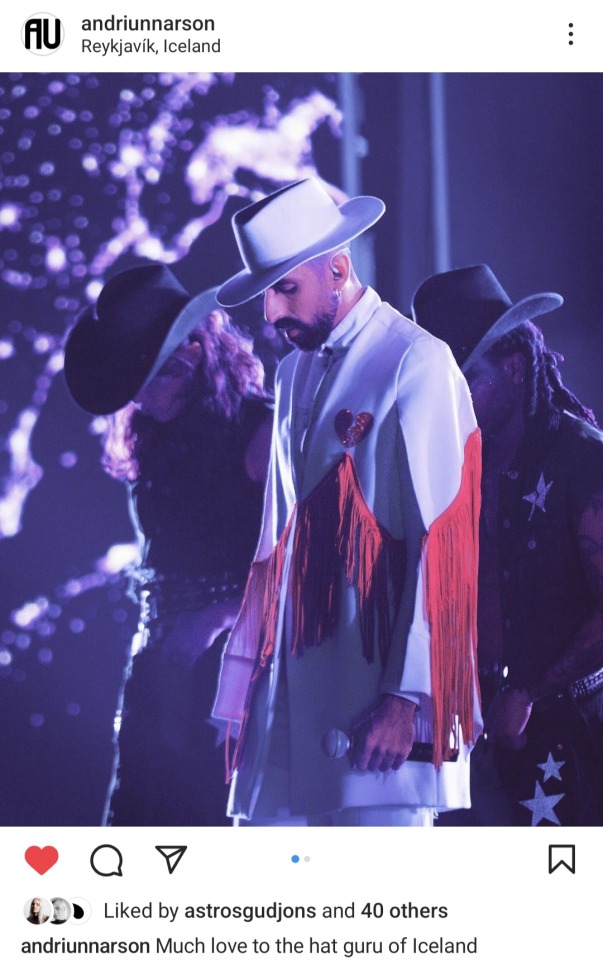

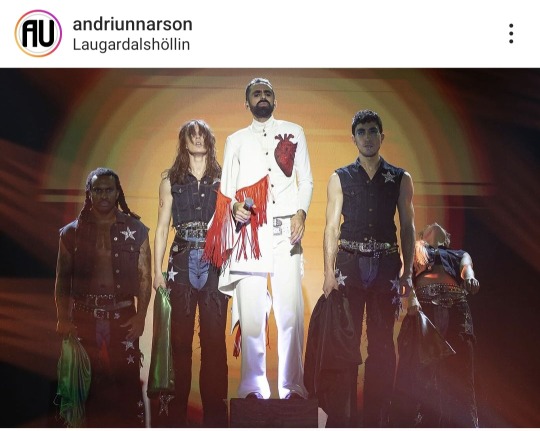
Whelp ... no reason not to play the shit out of this banger of a song now, I guess.
All respect to Hera Björk and the free democratic choices of my island friends at the opposite end of the world.
But holy shit.
This was the complete package. Just waiting to be picked up and sent. Could have made history.
Ah well.
6 notes
·
View notes